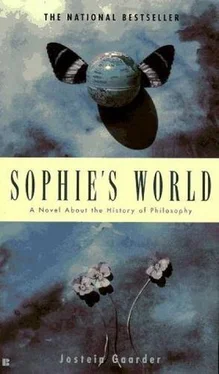Jostein Gaarder - Sophie's World - A Novel About the History of Philosophy
Здесь есть возможность читать онлайн «Jostein Gaarder - Sophie's World - A Novel About the History of Philosophy» весь текст электронной книги совершенно бесплатно (целиком полную версию без сокращений). В некоторых случаях можно слушать аудио, скачать через торрент в формате fb2 и присутствует краткое содержание. ISBN: , Издательство: BERKLEY BOOKS, NEW YORK, Жанр: Философия, на английском языке. Описание произведения, (предисловие) а так же отзывы посетителей доступны на портале библиотеки ЛибКат.
- Название:Sophie's World: A Novel About the History of Philosophy
- Автор:
- Издательство:BERKLEY BOOKS, NEW YORK
- Жанр:
- Год:неизвестен
- ISBN:0-425-15225-1
- Рейтинг книги:4 / 5. Голосов: 1
-
Избранное:Добавить в избранное
- Отзывы:
-
Ваша оценка:
- 80
- 1
- 2
- 3
- 4
- 5
Sophie's World: A Novel About the History of Philosophy: краткое содержание, описание и аннотация
Предлагаем к чтению аннотацию, описание, краткое содержание или предисловие (зависит от того, что написал сам автор книги «Sophie's World: A Novel About the History of Philosophy»). Если вы не нашли необходимую информацию о книге — напишите в комментариях, мы постараемся отыскать её.
Sophie's World: A Novel About the History of Philosophy — читать онлайн бесплатно полную книгу (весь текст) целиком
Ниже представлен текст книги, разбитый по страницам. Система сохранения места последней прочитанной страницы, позволяет с удобством читать онлайн бесплатно книгу «Sophie's World: A Novel About the History of Philosophy», без необходимости каждый раз заново искать на чём Вы остановились. Поставьте закладку, и сможете в любой момент перейти на страницу, на которой закончили чтение.
Интервал:
Закладка:
Sophie stood on the gravel path, thinking. She tried to think extra hard about being alive so as to forget that she would not be alive forever. But it was impossible. As soon as she concentrated on being alive now, the thought of dying also came into her mind. The same thing happened the other way around: only by conjuring up an intense feeling of one day being dead could she appreciate how terribly good it was to be alive. It was like two sides of a coin that she kept turning over and over. And the bigger and clearer one side of the coin became, the bigger and clearer the other side became too.
You can’t experience being alive without realizing that you have to die, she thought. But it’s just as impossible to realize you have to die without thinking how incredibly amazing it is to be alive.
Sophie remembered Granny saying something like that the day the doctor told her she was ill. “I never realized how rich life was until now,” she said.
How tragic that most people had to get ill before they understood what a gift it was to be alive. Or else they had to find a mysterious letter in the mailbox!
Perhaps she should go and see if any more letters had arrived. Sophie hurried to the gate and looked inside the green mailbox. She was startled to find that it contained another white envelope, exactly like the first. But the mailbox had definitely been empty when she took the first envelope! This envelope had her name on it as well. She tore it open and fished out a note the same size as the first one.
Where does the world come from? it said.
I don’t know, Sophie thought. Surely nobody really knows. And yet—Sophie thought it was a fair question. For the first time in her life she felt it wasn’t right to live in the world without at least inquiring where it came from.
The mysterious letters had made Sophie’s head spin. She decided to go and sit in the den.
The den was Sophie’s top secret hiding place. It was where she went when she was terribly angry, terribly miserable, or terribly happy. Today she was simply confused.
* * *
The red house was surrounded by a large garden with lots of flowerbeds, fruit bushes, fruit trees of different kinds, a spacious lawn with a glider and a little gazebo that Granddad had built for Granny when she lost their first child a few weeks after it was born. The child’s name was Marie. On her gravestone were the words: “Little Marie to us came, greeted us, and left again.”
Down in a corner of the garden behind all the raspberry bushes was a dense thicket where neither flowers nor berries would grow. Actually, it was an old hedge that had once marked the boundary to the woods, but because nobody had trimmed it for the last twenty years it had grown into a tangled and impenetrable mass. Granny used to say the hedge made it harder for the foxes to take the chickens during the war, when the chickens had free range of the garden.
To everyone but Sophie, the old hedge was just as useless as the rabbit hutches at the other end of the garden. But that was only because they hadn’t discovered Sophie’s secret.
Sophie had known about the little hole in the hedge for as long as she could remember. When she crawled through it she came into a large cavity between the bushes. It was like a little house. She knew nobody would find her there.
Clutching the two envelopes in her hand, Sophie ran through the garden, crouched down on all fours, and wormed her way through the hedge. The den was almost high enough for her to stand upright, but today she sat down on a clump of gnarled roots. From there she could look out through tiny peepholes between the twigs and leaves. Although none of the holes was bigger than a small coin, she had a good view of the whole garden. When she was little she used to think it was fun to watch her mother and father searching for her among the trees.
Sophie had always thought the garden was a world of its own. Each time she heard about the Garden of Eden in the Bible it reminded her of sitting here in the den, surveying her own little paradise.
Where does the world come from?
She hadn’t the faintest idea. Sophie knew that the world was only a small planet in space. But where did space come from?
It was possible that space had always existed, in which case she would not also need to figure out where it came from. But could anything have always existed? Something deep down inside her protested at the idea. Surely everything that exists must have had a beginning? So space must sometime have been created out of something else.
But if space had come from something else, then that something else must also have come from something. Sophie felt she was only deferring the problem. At some point, something must have come from nothing. But was that possible? Wasn’t that just as impossible as the idea that the world had always existed?
They had learned at school that God created the world. Sophie tried to console herself with the thought that this was probably the best solution to the whole problem. But then she started to think again. She could accept that God had created space, but what about God himself? Had he created himself out of nothing? Again there was something deep down inside her that protested. Even though God could create all kinds of things, he could hardly create himself before he had a “self” to create with. So there was only one possibility left: God had always existed. But she had already rejected that possibility! Everything that existed had to have a beginning.
Oh, drat!
She opened the two envelopes again.
Who are you?
Where does the world come from?
What annoying questions! And anyway where did the letters come from? That was just as mysterious, almost.
Who had jolted Sophie out of her everyday existence and suddenly brought her face to face with the great riddles of the universe?
For the third time Sophie went to the mailbox. The mailman had just delivered the day’s mail. Sophie fished out a bulky pile of junk mail, periodicals, and a couple of letters for her mother. There was also a postcard of a tropical beach. She turned the card over. It had a Norwegian stamp on it and was postmarked “UN Battalion.” Could it be from Dad? But wasn’t he in a completely different place? It wasn’t his handwriting either.
Sophie felt her pulse quicken a little as she saw who the postcard was addressed to: “Hilde Moller Knag, c/o Sophie Amundsen, 3 Clover Close ...” The rest of the address was correct. The card read:
Dear Hilde, Happy 15th birthday! As I’m sure you’ll understand, I want to give you a present that will help you grow. Forgive me for sending the card c/o Sophie. It was the easiest way. Love from Dad.
Sophie raced back to the house and into the kitchen. Her mind was in a turmoil. Who was this “Hilde,” whose fifteenth birthday was just a month before her own?
Sophie got out the telephone book. There were a lot of people called Moller, and quite a few called Knag. But there was nobody in the entire directory called Moller Knag.
She examined the mysterious card again. It certainly seemed genuine enough; it had a stamp and a postmark.
Why would a father send a birthday card to Sophie’s address when it was quite obviously intended to go somewhere else? What kind of father would cheat his own daughter of a birthday card by purposely sending it astray? How could it be “the easiest way”? And above all, how was she supposed to trace this Hilde person?
So now Sophie had another problem to worry about. She tried to get her thoughts in order:
This afternoon, in the space of two short hours, she had been presented with three problems. The first problem was who had put the two white envelopes in her mailbox. The second was the difficult questions these letters contained. The third problem was who Hilde Moller Knag could be, and why Sophie had been sent her birthday card. She was sure that the three problems were interconnected in some way. They had to be, because until today she had lived a perfectly ordinary life.
Читать дальшеИнтервал:
Закладка:
Похожие книги на «Sophie's World: A Novel About the History of Philosophy»
Представляем Вашему вниманию похожие книги на «Sophie's World: A Novel About the History of Philosophy» списком для выбора. Мы отобрали схожую по названию и смыслу литературу в надежде предоставить читателям больше вариантов отыскать новые, интересные, ещё непрочитанные произведения.
Обсуждение, отзывы о книге «Sophie's World: A Novel About the History of Philosophy» и просто собственные мнения читателей. Оставьте ваши комментарии, напишите, что Вы думаете о произведении, его смысле или главных героях. Укажите что конкретно понравилось, а что нет, и почему Вы так считаете.












